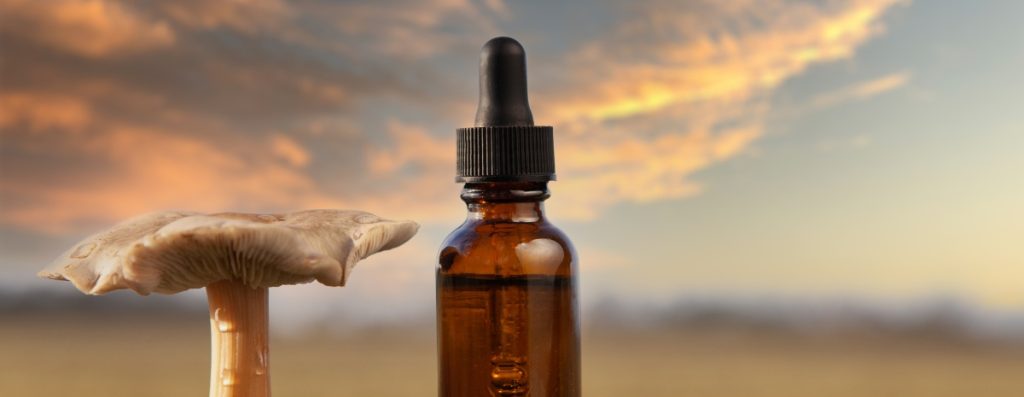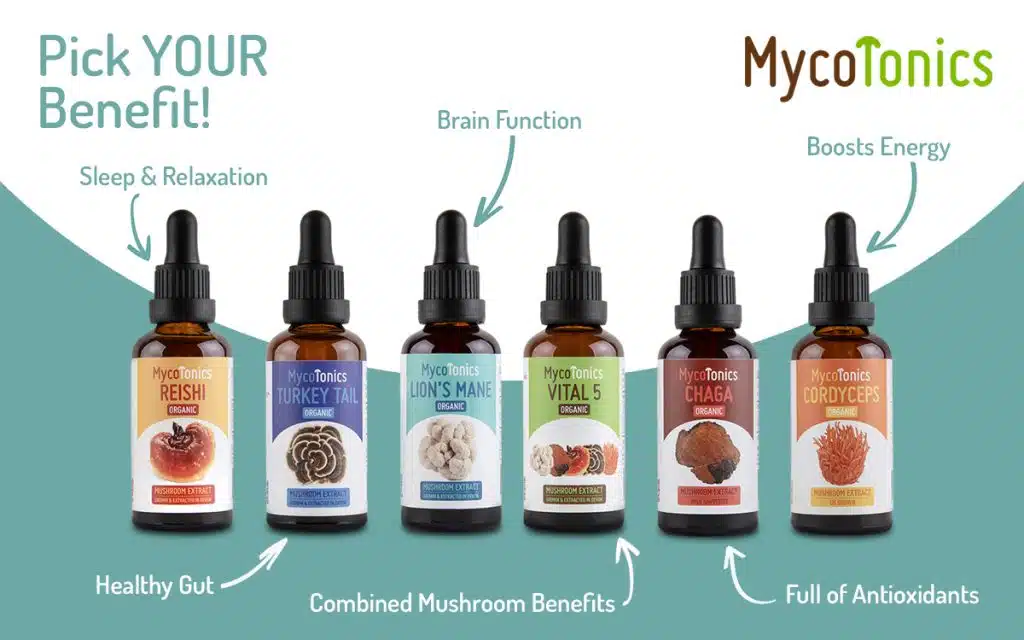Even though traditional healers have used medicinal mushrooms to treat medical conditions for thousands of years, scientists are still learning more about them every day.
There are plenty of animal studies to back up medicinal mushroom health claims, but, to date, only a few studies have used human subjects.
However, we do know medicinal mushrooms are full of potent antioxidants and anti-inflammatory compounds that help boost immune systems and slow aging.
And what’s more you can make medicinal mushroom extracts at home. The process is relatively easy and does not need specialized equipment.
Of course you can also buy extracts, or tinctures, off the shelf and benefit in that way. If you’re in the UK I’d love for you to check out our MycoTonics range of extracts.
So, how do you make mushroom medicine?
To make mushroom medicine, you need to extract the mushrooms’ bioactive compounds. One of the best ways to do this is by making mushroom tincture.
In this article, you’ll discover what a mushroom tincture is and why you should make one.
You’ll also find the different methods and types of mushrooms you can use. And we’ll show you how to make a mushroom tincture step by step.
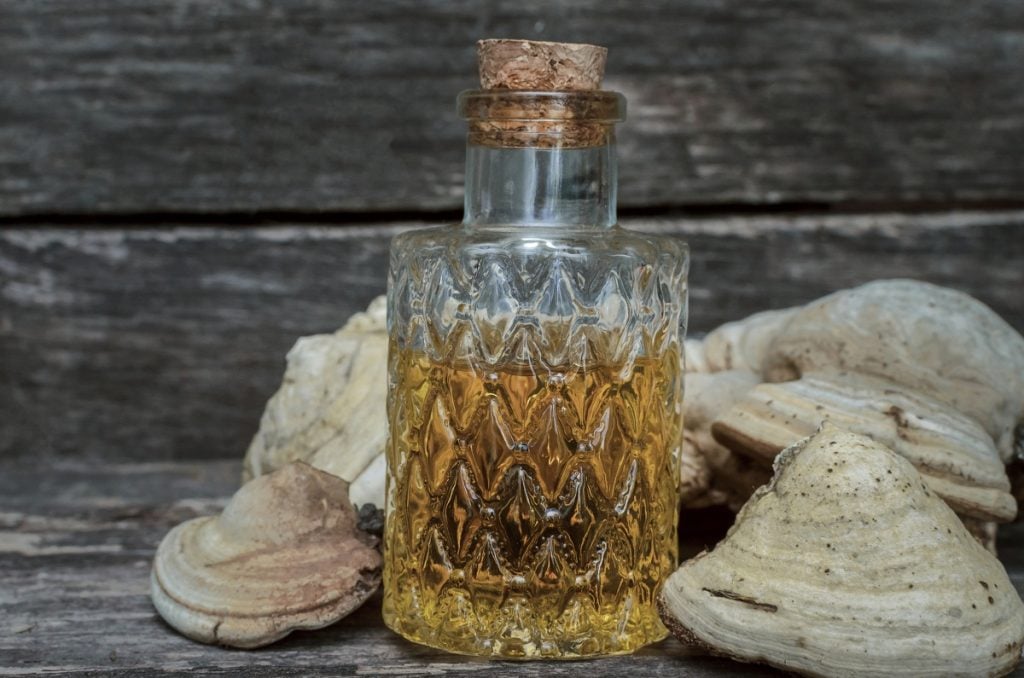
What is a Mushroom Tincture?
A mushroom tincture is a concentrated liquid extract created by soaking medicinal mushrooms in an alcohol-based solvent.
The solvent extracts the medicinal compounds from the mushrooms and leaves you with mushroom medicine.
There’s sometimes confusion about the difference between a tincture and an extract.
A tincture is an extract that specifically uses alcohol as one of the solvents to draw the beneficial compounds out of mushrooms.
On the other hand, you can make an extract by soaking mushrooms in any type of solvent, including hot water, vinegar or alcohol.
Tinctures are not only made using mushrooms. You can also make a tincture from the berries, bark, dried or fresh leaves and roots of plants.
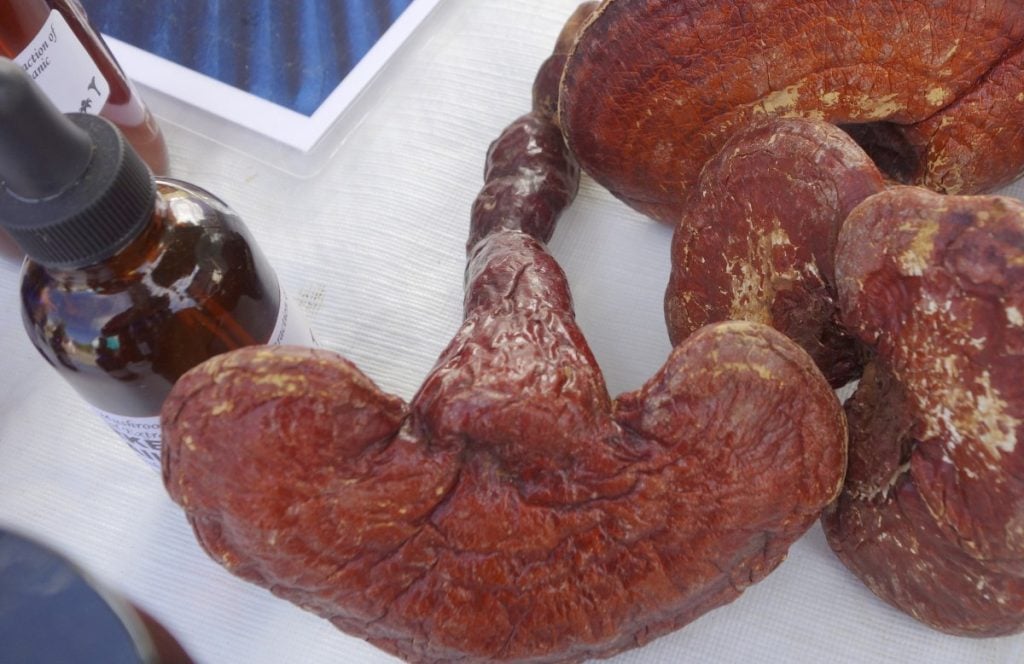
Why Make a Mushroom Tincture?
Medicinal mushrooms are full of proteins and beneficial compounds like polysaccharides, terpenoids and triterpenes. But, to get to them, you need to break down the mushrooms’ chitin cell walls.
Additionally, many medicinal mushrooms are woody and tough, making eating them unpleasant.
When you make a tincture, you break down the chitin and dissolve the beneficial compounds in solvents, making them readily available.
Mushroom tinctures are also convenient.
It’s not always easy to incorporate mushrooms into your daily meals. But, a few drops of tincture under your tongue or in your morning drink is quick and easy.
And a few drops of concentrated tincture contain all the benefits of a handful of dried medicinal mushrooms.
Another benefit of tinctures is that they’re usually inexpensive and easy to make.
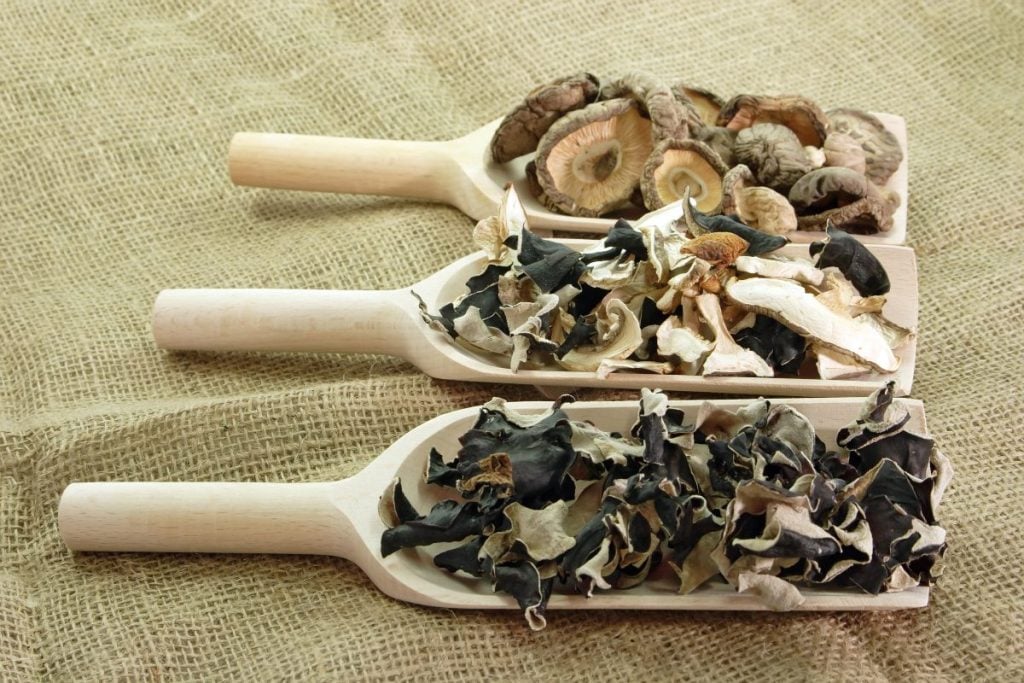
Different Methods for Making Mushroom Tinctures
There are over 700 species of medicinal mushrooms known to contain bioactive compounds.
They all differ and require different extraction techniques and solvents to access the beneficial compounds and make them available.
With this in mind, you may be wondering, “How do you make medicinal mushroom tinctures?”
Depending on the type of mushroom and its compounds, you may only need one extraction method to access all the benefits, but, often a combination is required.
Some mushrooms like cordyceps, turkey tail, lion’s mane, shiitake, tremella and maitake contain sought-after water-soluble compounds.
But, chaga and reishi, some of the most potent medicinal mushrooms, require alcohol to extract non-water-soluble triterpenes and sterols.
Here are some of the different methods used to make extracts and tinctures:
Hot Water Extraction
Hot water extraction uses hot water as a solvent to break down the chitin cell walls of fungi and dissolves water-soluble polysaccharides like beta-glucans.
So if you want to access the antioxidant and anti-inflammatory benefits of a mushroom’s water-soluble compounds, you’ll need to use hot water extraction.
Depending on who you ask, hot water extraction involves simmering the mushrooms over low heat anywhere from 30 minutes to a couple of days. We recommend simmering your mushrooms for two hours.
Hot water-based extractions alone are technically teas and infusions, not tinctures. But hot water extraction is often used in conjunction with alcohol extraction to create full-spectrum tinctures that contain all the beneficial compounds found in mushrooms.
A water-based infusion won’t last as long as an alcohol-based tincture.
Alcohol Extraction
People use alcohol extraction to extract non-water-soluble compounds, like terpenoids, phenolics, triterpenoids, inositols, ergosterols and sterols from mushrooms.
This method uses food-grade alcohol and involves soaking medicinal mushrooms for two to six weeks in alcohol to extract the beneficial compounds.
Double Extraction
Double extraction uses alcohol and water as solvents to extract both water-soluble beta-glucans and more alcohol-soluble triterpenes.
People frequently use this method to make mushroom tinctures, as in most cases, it’s the best way to access all a mushroom’s medicinal compounds.
How to Make a Double Extraction Mushroom Tincture
In the step-by-step guide below, we take you through the process of making a double extraction tincture using dried mushrooms or mushroom powder.
We like to use a selection of medicinal mushrooms when making a tincture, so it contains a broader range of benefits, but you can also make a tincture using only one type of mushroom.
Here are the steps to follow to make a double extraction mushroom tincture.
Step 1: Gather Your Supplies
The first step is to gather all the equipment and materials required to make the tincture.
Equipment:
-
- 2 x 1liter glass Kilner or mason jars for the alcohol extraction
-
- 10 x 100ml glass dropper bottles. Dark glass is preferable
-
- 1 x 3-liter pyrex dish for the decoction (simmering the mushrooms in water)
-
- Fine cheesecloth or muslin cloth for straining
-
- A funnel for decanting the tincture
-
- A hob or gas burner
Materials:
-
- 1-liter high proof (70%-95%) clear grain alcohol
We use Vodka that is 40% alcohol by volume, equivalent to 80% proof, as it’s easy to source.
- 1-liter high proof (70%-95%) clear grain alcohol
-
- Dried mushrooms or mushroom powder
You can use your choice of dried mushrooms or mushroom powder.
- Dried mushrooms or mushroom powder
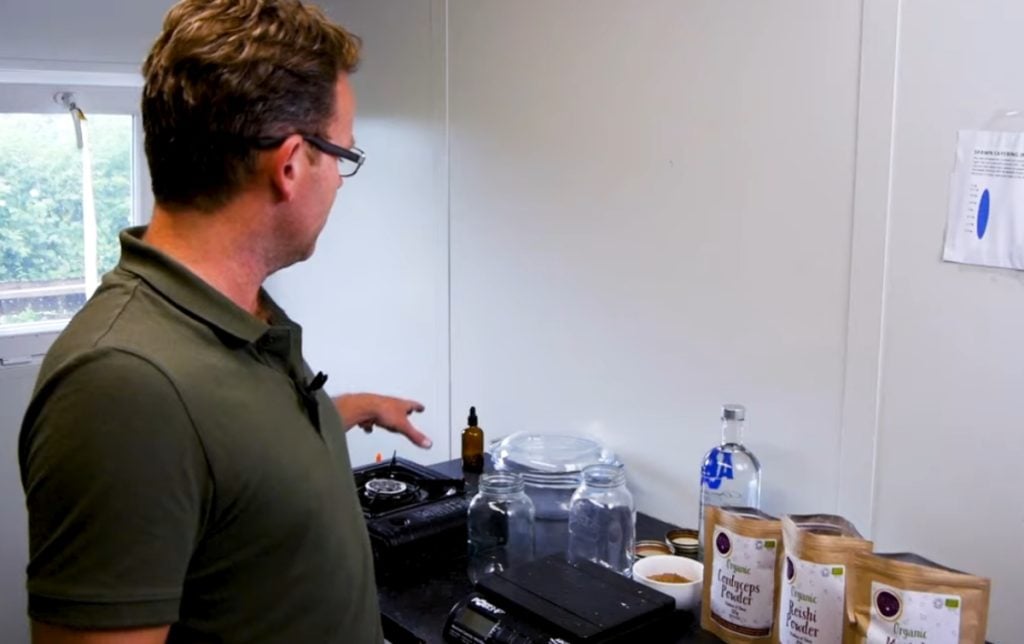
Step 2: Alcohol Extraction
The first step when making a double extraction mushroom tincture is alcohol extraction.
For this, you will need your Kilner or mason jars, alcohol and dried mushrooms or mushroom powder.
If you have large dried mushrooms, chop them into smaller pieces, and half fill the mason jars with dried mushroom pieces.
If you are using different types of mushrooms, add equal portions of the mushrooms to each jar until they are approximately half full.
For example, when we use five different types of mushrooms, we add 25g (0.88oz) of each to a jar.
Now add around 0.5 liters of Vodka to each jar, enough to cover the mushrooms and still have space at the top.
Put the lids on your jars, shake well and leave them to soak for two to six weeks.
Tips:
Grinding or chopping your dried mushrooms into small pieces exposes a greater surface area to alcohol, allowing you to extract more of the compounds.
Shake your jar once a day to help keep the alcohol evenly distributed for maximum extraction.
Step 3: Strain the Alcohol
After two weeks, you can filter or strain the mushroom material out of the alcohol extract using cheesecloth or muslin cloth.
We use a cloth to filter the alcohol as it allows you to squeeze the mushroom material and extract as much alcohol as possible.
You will end up with around half a liter of mushroom-enriched alcohol.
If you’re using mushroom powder to make your tincture, we recommend straining the mixture through a fine muslin cloth folded over a few times, as this will capture more of the powder.
We use a funnel to pour the mushroom enriched alcohol back into the vodka bottle, but any glass bottle or container will do.
Once you have squeezed out as much of the alcohol as you can, add the mushroom material to your pyrex bowl together with 1.5 liters of water.
Now you are ready to move on to the next stage of your dual extraction.
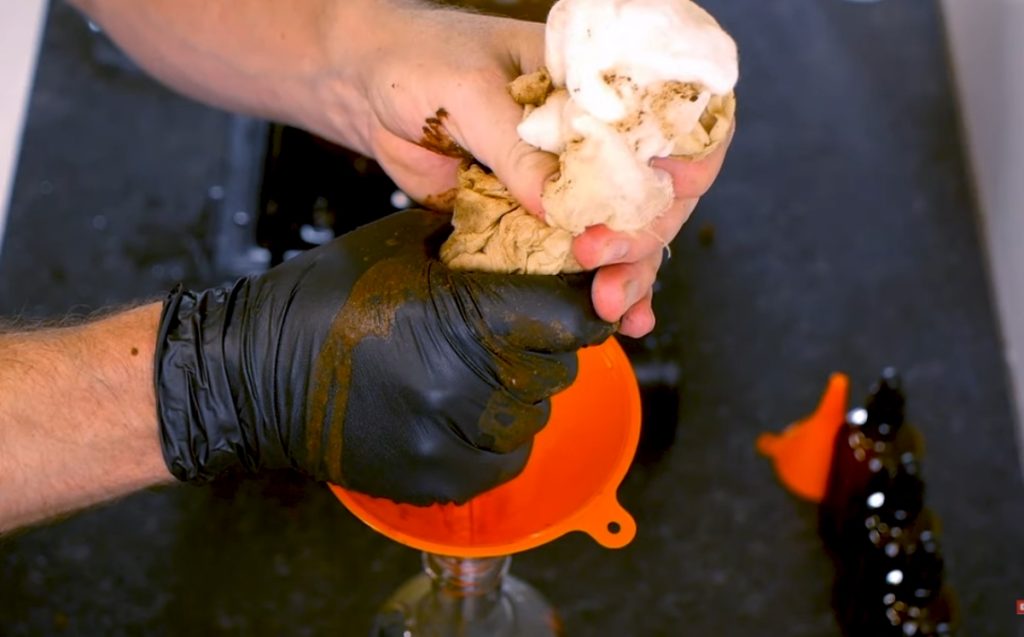
Step 4: Hot Water Extraction
Place the pyrex bowl of water and mushroom material on a hot plate or gas burner and bring it to a boil.
Then turn down the heat and slowly simmer the mushrooms for two hours to break down the chitin and draw out the polysaccharides.
At the end of the process, you should end up with around half a liter of liquid with a thick mud-like consistency and amazing mushroomy smell.
Be careful not to let your mushrooms boil dry during the process. If the water is getting a bit low, top it up.
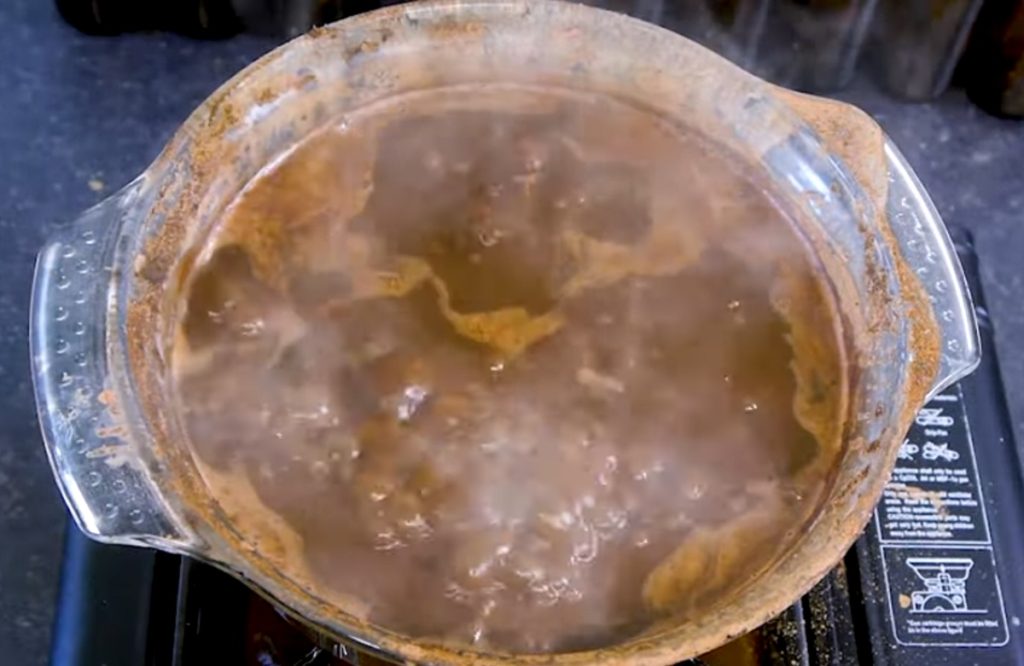
Step 5: Strain the Water
Allow the mushroom and water mixture to cool down before filtering or straining it using cheesecloth or muslin cloth.
Squeeze as much of the water out of the mushroom material as you can, and you should end up with around half a liter of mushroom-infused water.
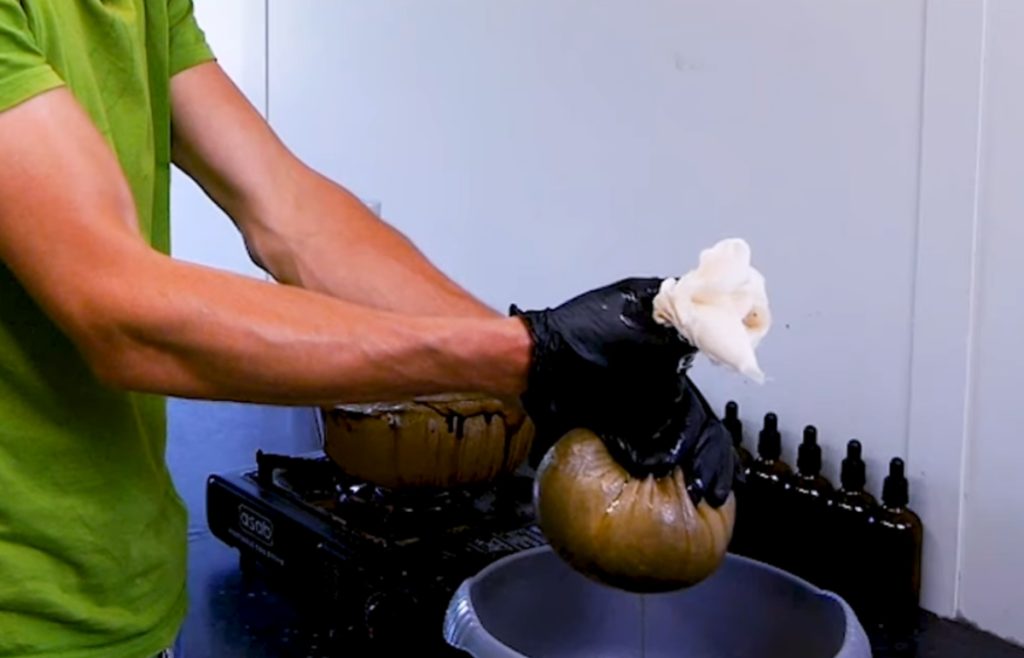
Step 5: Combine the Water and Alcohol Extractions
Once you finish both extraction methods, you should have more or less equal quantities of alcohol and water.
Use a funnel to add the water extract to the bottle or container of alcohol extract and mix them together.
Once your extracts are combined, you have a full-spectrum mushroom tincture.
Decant your medicinal mushroom tincture into the ten 100ml dropper bottles and store them in a cool, dry, dark place.
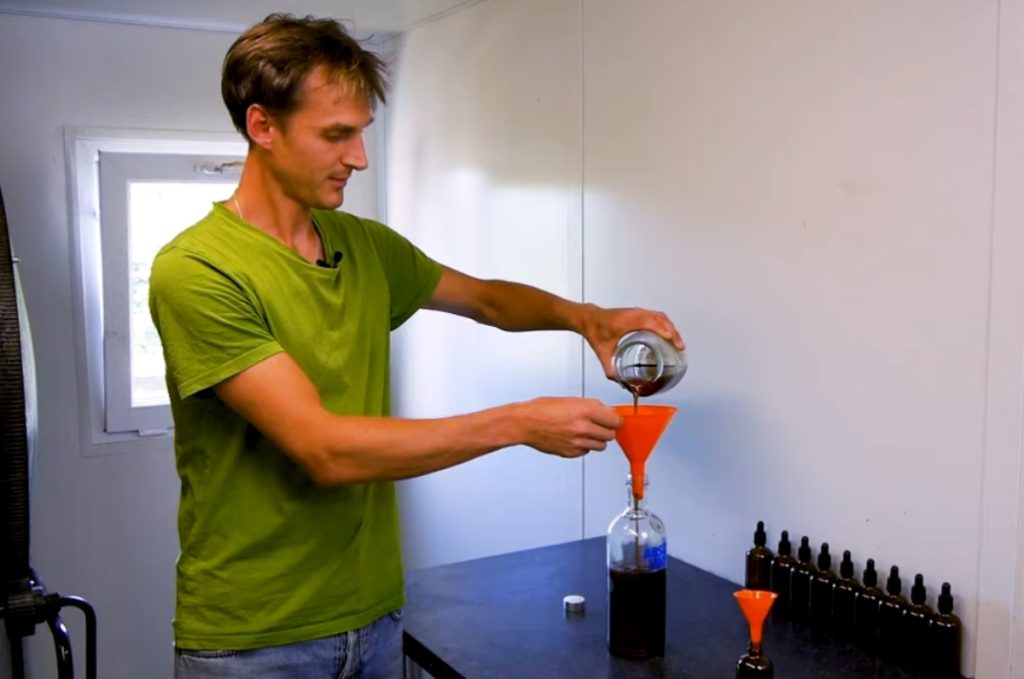
Medicinal Mushroom Species You Can Use to Make a Tincture
When making a tincture, you can use one medicinal mushroom species or mix several to get a range of health benefits.
Here are seven of the medicinal mushrooms that you could use to make a tincture and their health benefits:
1. Reishi
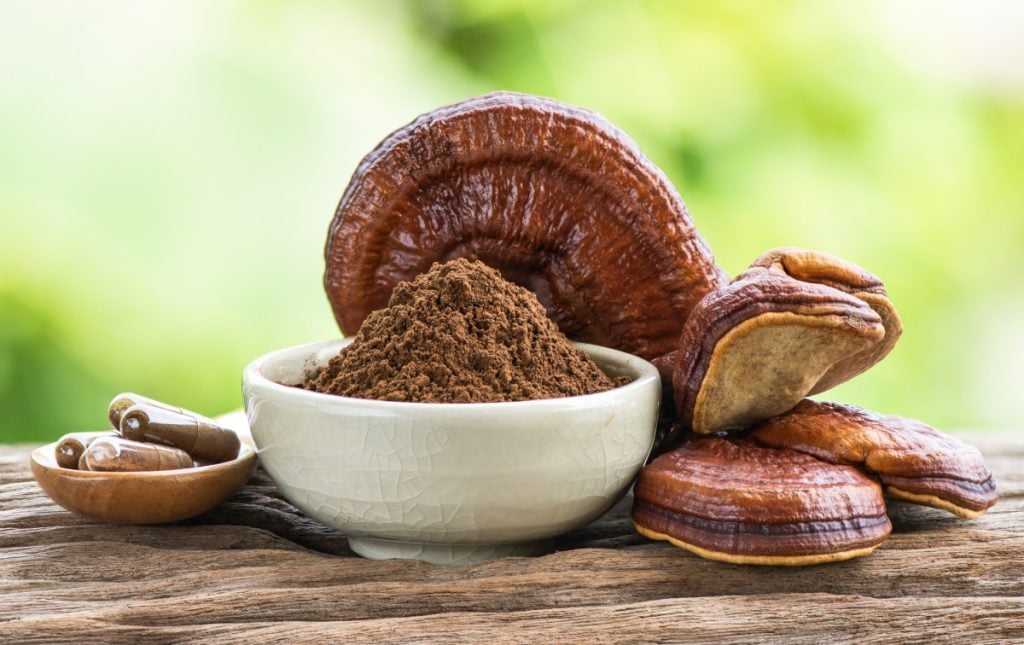
For thousands of years, traditional Chinese medicine has used reishi, known as the mushroom of immortality, to promote health and longevity.
Reishi contains over 400 compounds that provide medicinal benefits and boost the immune system. The most important of these compounds are triterpenoids and polysaccharides.
Scientists have well researched some of the health benefits of reishi, but others need more research.
Reishi is said to have anti-tumor, anti-microbial, antioxidant, anti-inflammatory, anti-diabetic, anti-aging, and antiviral (specifically against HIV and herpes) effects.
Our article “Reishi Mushroom Benefits and How to Get Them” has more information on the health benefits of these amazing medicinal mushrooms.
And, if you’re wondering how to make a tincture from reishi mushrooms, the best method is dual extraction because reishi mushrooms have both water-soluble and alcohol-soluble medicinal compounds.
Dual extraction will ensure your reishi tincture contains as many reishi mushroom medicinal compounds as possible.
2. Lion’s Mane
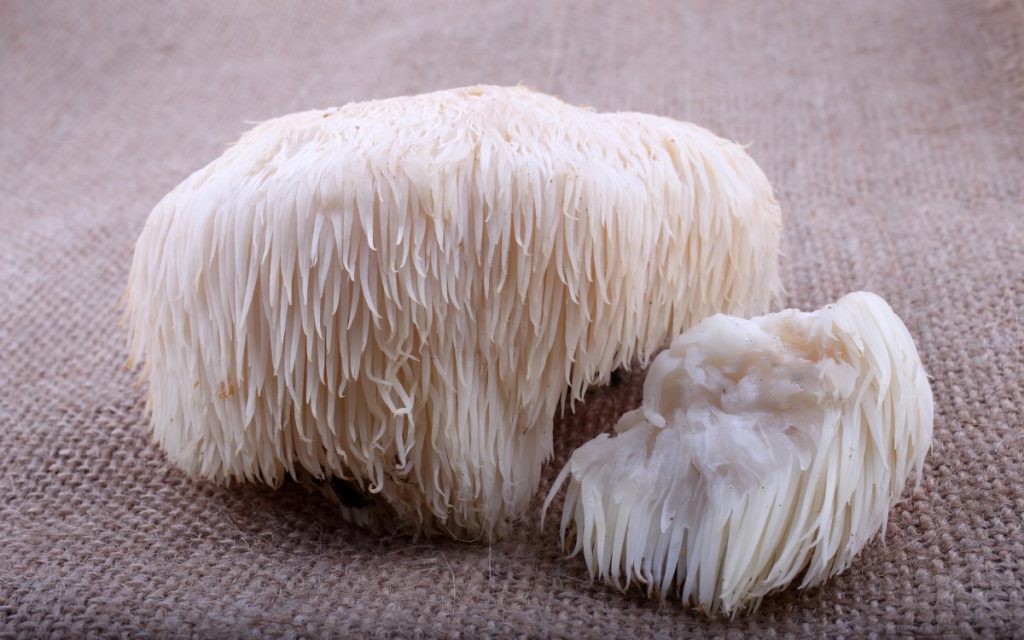
Lion’s mane mushrooms are unique-looking edible mushrooms found on decaying hardwood trees and logs throughout the northern hemisphere.
They are potent medicinal mushrooms that offer many health benefits, but are best known for their impact on brain health.
They contain a substance called “erinacine,” which studies have shown can initiate the growth and regeneration of nerves and improve cognitive abilities.
Lion’s mane also helps to boost the immune system by protecting the body from germs that enter through the nose and mouth.
Like many other medicinal mushrooms, lion’s mane has anti-inflammatory properties.
Lion’s mane can help reduce inflammation and the symptoms of inflammatory bowel disease.
How Do You Make Lion’s Mane Mushroom Tincture?
You can make a lion’s mane mushroom tincture using fresh or dried lion’s mane, and both the fruiting body and the mycelium of lion’s mane mushrooms have beneficial compounds.
Dual extraction is required to get all the benefits of lion’s mane as the beneficial compounds for nerve and brain function need alcohol extraction, and several other medicinal compounds are accessed using hot water extraction.
3. Maitake
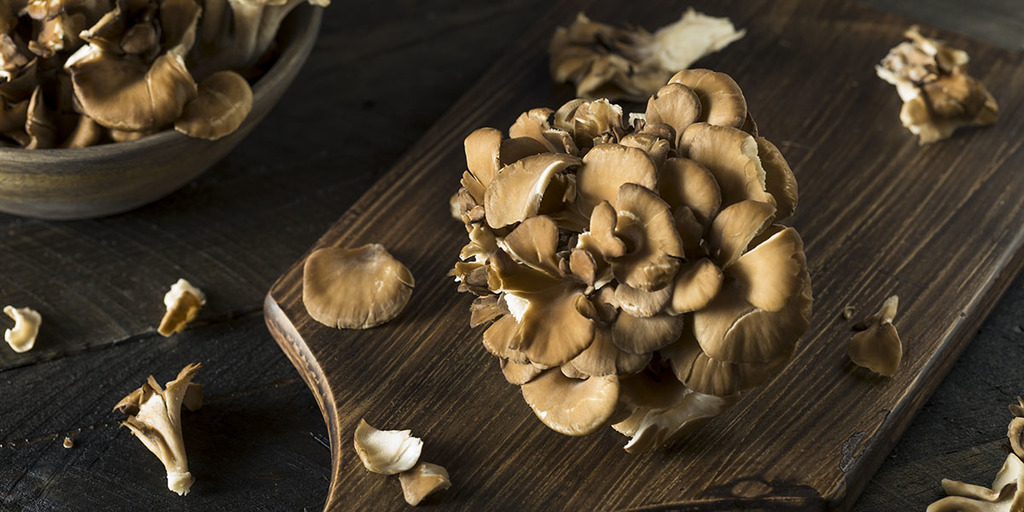
Maitake is another edible medicinal mushroom that people use to help with high blood pressure, cholesterol, cancer, and diabetes.
Maitake is rich in polysaccharides with immune-protecting, anti-tumor, antiviral and antibacterial properties.
They may also help control diabetes by reducing blood glucose levels and preventing insulin resistance.
4. Shiitake
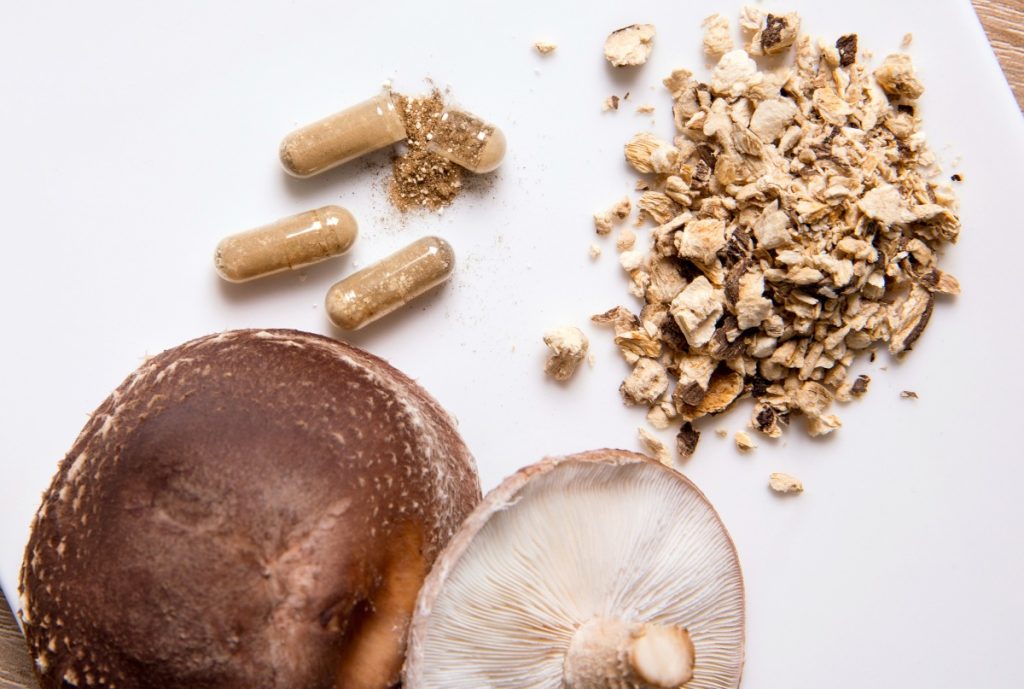
Packed full of beneficial vitamins and minerals, shiitake mushrooms have played a role in traditional Chinese medicine for thousands of years.
They contain a soluble fiber called beta-glucan, which helps to promote heart health and reduce cholesterol.
They’re also high in antioxidants, have anti-inflammatory properties and help treat viral infections like hepatitis C and HPV.
5. Chaga
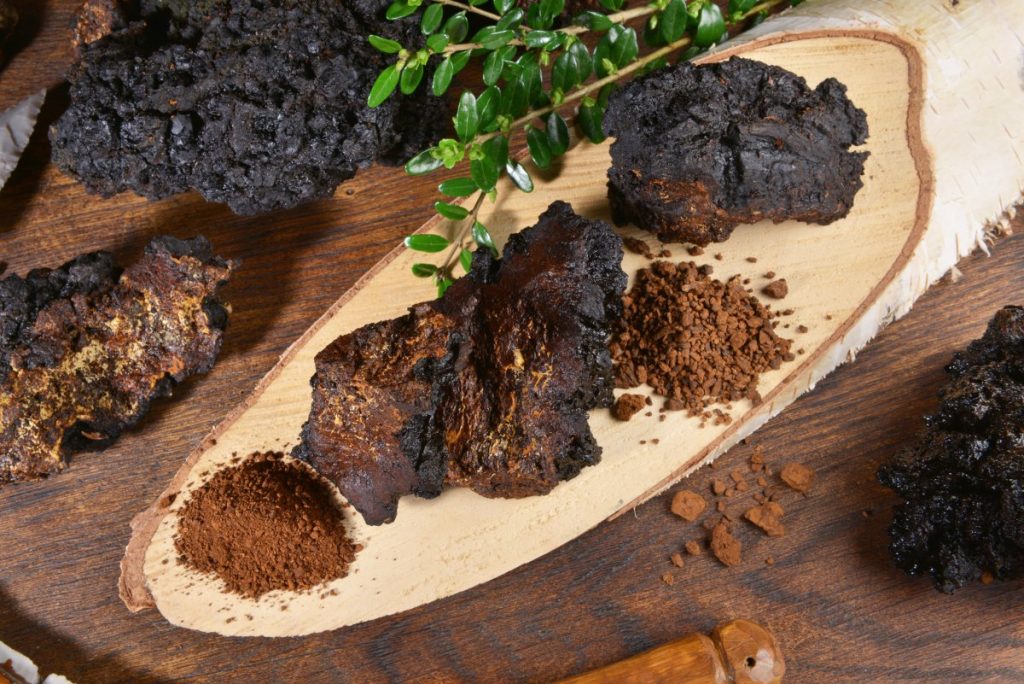
Chaga mushrooms are a strange-looking fungus that grow on birch trees and look a bit like a piece of charcoal or charred wood.
Chaga is high in antioxidants, natural polysaccharides that help remove oxidative stress from the body and slow aging.
Like other medicinal mushrooms, the bioactive compounds in Chaga help boost the immune system. They also help lower blood sugar, prevent heart disease, protect the liver and assist with diabetes.
Research shows that Chaga may be valuable when fighting cancer and may prevent or slow the growth of certain types of cancer and tumors.
To learn more about chaga’s health benefits take a look at our article, “13 Remarkable Chaga Mushroom Health Benefits That Will Amaze You.”
6. Cordyceps
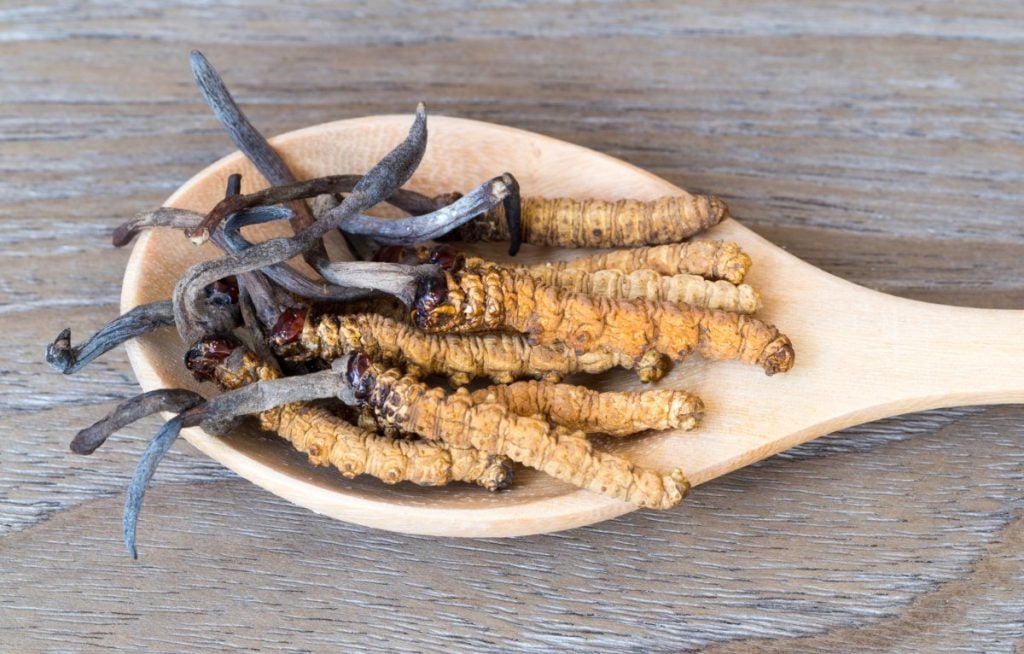
Cordyceps is a parasitic fungus that uses insects as a host and is one of the most expensive mushrooms in the world.
Cordyceps helps to boost the immune system and manage diabetes. They also have anti-inflammatory and anti-arthritic effects.
It’s one of the best medicinal mushrooms to use for cholesterol management and heart disease, but to date, studies showing its effects have only used animals.
There is also growing evidence that cordyceps may help fight tuberculosis and cancer. To learn more have a look at our article on the health benefits of cordyceps.
7. Turkey Tail
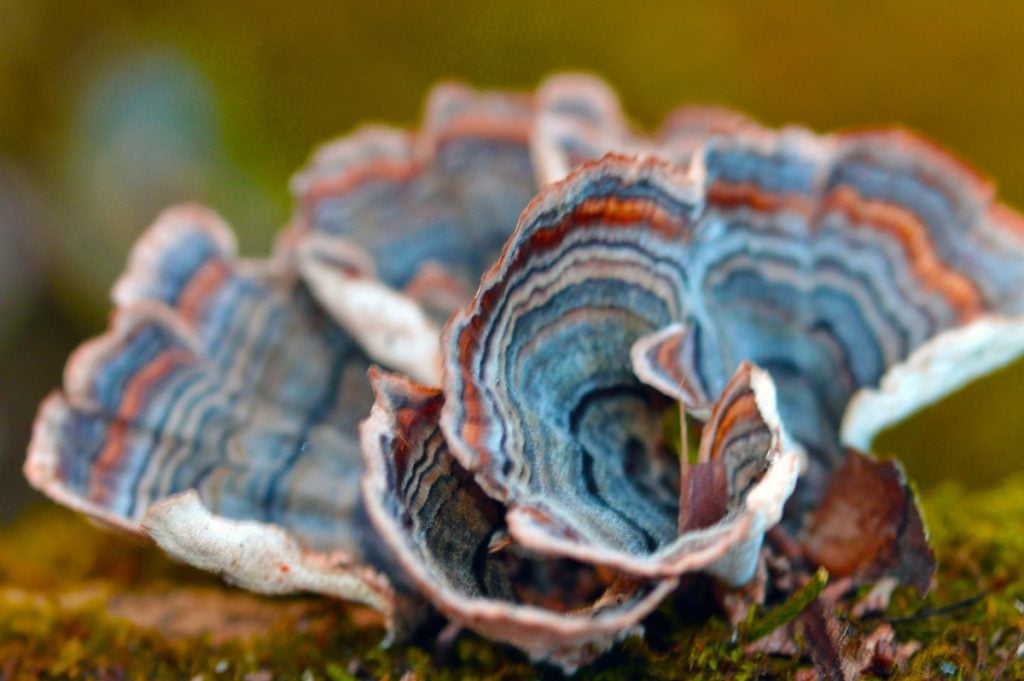
Turkey tail mushrooms are brightly colored shelf fungus commonly found in hardwood forests worldwide.
They’re one of the more studied medicinal mushrooms and have numerous health benefits but are best known for their role in cancer treatment.
Turkey Tail mushrooms also help boost the immune system, improve insulin resistance and prevent obesity.
To make a turkey tail mushroom tincture, you need to chop, tear or grind fresh or dried turkey tail into small pieces and then follow the instructions above to make a double extraction tincture.
Our complete guide to medicinal mushrooms has more information. And, if you want to include more medicinal mushrooms in your diet, our medicinal mushroom extract and supplement buyers guide will help you choose the best products..
Who Should Take Mushroom Tincture?
Many people take mushroom tinctures to treat specific health conditions or in conjunction with other treatments.
And, while nearly everyone can benefit from mushroom tinctures as they help boost immunity, improve sleep and reduce stress, some medicinal mushrooms act as blood thinners, and many are known to affect blood sugar levels.
So it’s advisable to speak to a medical professional before you add a mushroom tincture to your daily routine.
How Do You Take Mushroom Tincture?
A mushroom tincture should be taken orally as a dietary supplement, and for maximum benefits, try to take mushroom tincture daily on an ongoing basis.
As it’s so concentrated, you only need a small amount, around one to two droppers full, once or twice a day.
To take mushroom tincture, first, shake the bottle, then draw up a dropper full and place it under your tongue.
Or, if you’re not fond of the mushroomy flavor, you can add a few droppers of tincture to your morning coffee or smoothie.
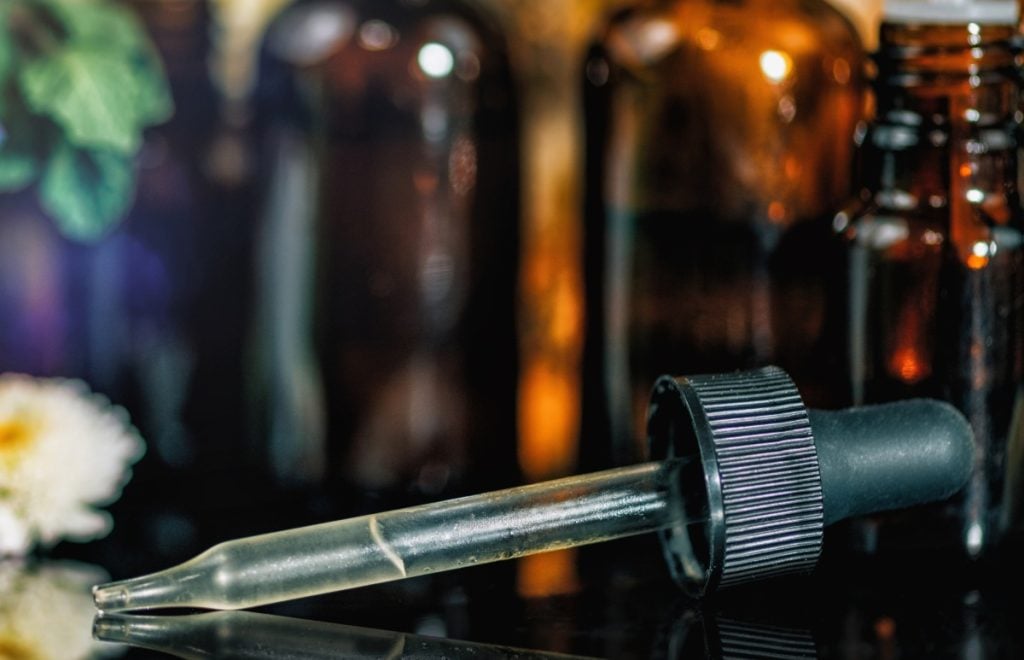
Final Thoughts
You can make mushroom tinctures from many medicinal mushrooms, and they’re a convenient way to access all the beneficial compounds.
To make a mushroom tincture you can buy fresh or dried medicinal mushrooms or mushroom powder. Or, you can grow medicinal mushrooms at home and use them fresh or dried to make a tincture.
Visit our Mushroom Growing Hub to learn more about growing mushrooms at home and how to get started.
